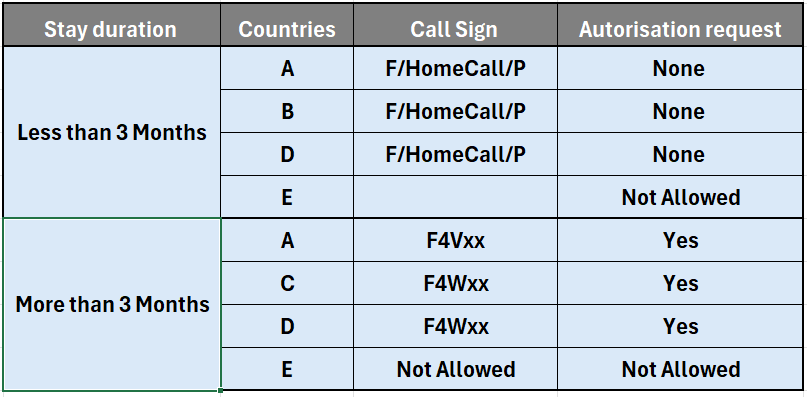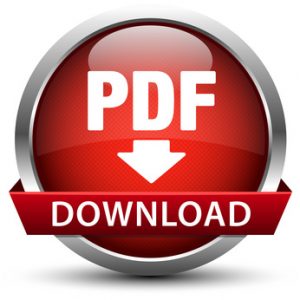Can I operate in France under my current amateur radio licence? Yes, especially if you are making a short visit to France, say for a holiday or similar, and you hold a licence issued by a country that has implemented CEPT Recommendation T/R 61-01. You need to find out if the class of your home licence is recognized as a CEPT Radio Amateur Licence. If you are uncertain about this, you can find out by contacting your home licensing administration and by visiting the European Radiocommunications Office (ERO) website.
Yes, especially if you are making a short visit to France, say for a holiday or similar, and you hold a licence issued by a country that has implemented CEPT Recommendation T/R 61-01. You need to find out if the class of your home licence is recognized as a CEPT Radio Amateur Licence. If you are uncertain about this, you can find out by contacting your home licensing administration and by visiting the European Radiocommunications Office (ERO) website.
Where can I find out about CEPT T/R 61-01?
The text of T/R 61-01 is available here ![]()
Annex 2 contains the information on national licence equivalence.
There is also a summary table listing those countries which have implemented the T/R 61-01.
The text of T/R 61-02 is available here ![]()
If you are planning a long stay in France (more than 3 months), you will need to use the reciprocal licensing arrangements – see later.
What licence conditions must I obey? Under CEPT T/R 61-01, the CEPT Radio Amateur Licence, you must operate in accordance with the Terms, Conditions and Limitations of the CEPT class 1 or 2, which are available from ANFR.
Under CEPT T/R 61-01, the CEPT Radio Amateur Licence, you must operate in accordance with the Terms, Conditions and Limitations of the CEPT class 1 or 2, which are available from ANFR.
What documentation do I need to carry when operating in France?
You must carry your home licence, which must be in English or in French and show that it is equivalent to a CEPT Radio Amateur Licence.
Reciprocal licences – who will still need these?  Licensed amateurs from countries, which have not implemented CEPT Recommendation T/R 61-01 or T/R 61-02, will still need to obtain a temporary French licence from ANFR. Such licences are issued on the strength of their home licence if a reciprocal agreement has been entered into between France and the government of their country under which we recognise each other’s qualifications. See table below and this document :
Licensed amateurs from countries, which have not implemented CEPT Recommendation T/R 61-01 or T/R 61-02, will still need to obtain a temporary French licence from ANFR. Such licences are issued on the strength of their home licence if a reciprocal agreement has been entered into between France and the government of their country under which we recognise each other’s qualifications. See table below and this document : ![]()
A – Countries in UE :
Germany, Austria, Bulgaria, Belgium, Cyprus, Croatia, Denmark, Spain, Estonia, Finland, Greece, Hungary, Ireland, Italy, Latvia, Lithuania, Luxembourg, Malta, Netherlands, Poland, Portugal, Czech Republic, Romania, Slovakia, Slovenia, Sweden.
B – Countries outside the EU applying the TR/61-01 recommendation from CEPT :
Albania, South Africa, Netherlands Antilles, Australia, Bosnia and Herzegovina, Canada, Curacao, United States, Iceland, Israel, Liechtenstein, North Macedonia, Monaco, Moldova, Montenegro, Norway, New Zealand, Peru, United Kingdom, Serbia, Switzerland, Turkey, Ukraine.
C – Countries outside the EU applying the T/R 61-02 recommendation from CEPT :
Albania, South Africa, Australia, Curacao, Hong Kong, Israel, Iceland, Japan, North Macedonia, Moldova, Monaco, Montenegro, Norway, New Zealand, United Kingdom, Serbia, Switzerland, Turkey, Ukraine
D – Countries that have signed a state-to-state agreement with France :
Australia, Brazil, Canada, Ivory Coast, United States, Japan, Kenya, Monaco, Kingdom of Thailand.
E – Others

How should I identify when operating in France?
 You should use the french prefix ‘F’ , then a forward slash,‘/’, followed by your home callsign.. Thus an amateur from the Netherlands holding the callsign PA2TIL would identify in Martinique as FM/PA2TIL.
You should use the french prefix ‘F’ , then a forward slash,‘/’, followed by your home callsign.. Thus an amateur from the Netherlands holding the callsign PA2TIL would identify in Martinique as FM/PA2TIL.
Here are some of the secondary locator to use: F (Metropolitan France) TK (Corse) FG (Guadeloupe) FM (Martinique) FR (Réunion) FP (St Pierre et Miquelon) FH (Mayotte).
How long can I operate in France? T/R 61-01 is intended to cover temporary stays, for up to 3 months. For longer stays, amateurs from CEPT Administrations, which have adopted T/R 61-02, can apply to ANFR for a Full French licence. You will need to complete a normal Amateur Radio Licence application form and to provide the following:
T/R 61-01 is intended to cover temporary stays, for up to 3 months. For longer stays, amateurs from CEPT Administrations, which have adopted T/R 61-02, can apply to ANFR for a Full French licence. You will need to complete a normal Amateur Radio Licence application form and to provide the following:
- The certified photocopy of his Amateur Radio certificate and of his license (please indicate the lasting quality of your licence issued by the administration of your country and supply this document either in French or in English)
- A proof he has been living in France for more than 3 months (EDF or France Telecom invoice)
- Use the form :

Can I operate the station of a French radio amateur?
 Yes, with the permission of the French licensee. You may operate his equipment under your own licence, using your own callsign prefixed as described above, as if it were your own station, or you may operate under the direct supervision of the French licensee and under his licence using the French licensee’s callsign.
Yes, with the permission of the French licensee. You may operate his equipment under your own licence, using your own callsign prefixed as described above, as if it were your own station, or you may operate under the direct supervision of the French licensee and under his licence using the French licensee’s callsign.
Further information
For enquiries regarding French amateur radio licences please contact ANFR.
ANFR
4 Rue Alphonse MATTER – BP 8314
88108 SAINT DIÉ DES VOSGES
N° international Tél. : + 33 3 29 42 20 74
Fax : + 33 3 29 42 20 70
Email: amat@anfr.fr
Website: https://www.anfr.fr/gerer/radioamateurs/nos-missions
Disclaimer
Whilst every effort was made to ensure that the information given herein is accurate, no responsibility is accepted by REF, or the author for any errors, omissions or misleading statements in that information by negligence or otherwise, and no responsibility is accepted in regard to any subsequent action based on this note.
